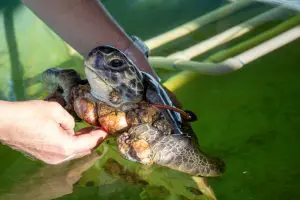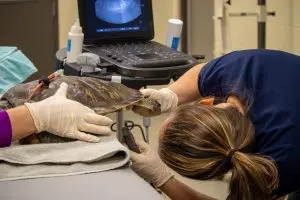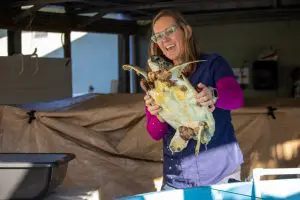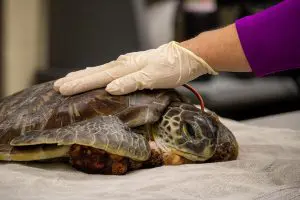

Matcha is fighting hard as they recover!
Our Sea Turtle Healing Center is working around the clock to help our newest patient, Matcha. This juvenile green sea turtle, named after their matcha-green coloration, was found washed ashore around the Malabar area.
When the Sea Turtle Preservation Society brought the patient in, our veterinary team immediately noticed the fishing line coiled around Matcha’s body and the laceration it had made on their mouth.
The team’s next step was to check for any fishing line caught in the turtle’s gastrointestinal (GI) tract with a CT scan and ultrasound. A sure sign that man-made material has made its way inside a turtle is if their GI looks bunched up like an accordion on an ultrasound image, said Sea Turtle Program Manager Shanon Gann.

Matcha undergoes an ultrasound to check on their GI tract after surgery.
And unfortunately, that was the case for Matcha.
After successfully putting the turtle under anesthesia for surgery, our veterinary team removed about 3 feet of monofilament recreational fishing line. We placed an esophageal feeding tube to assist with giving them food and medication, since they are not eating on their own yet, Shanon said.

Sea Turtle Program Manager Shanon Gann lifts Matcha out of their tank.
During Matcha’s slow recovery period, our team will keep a close watch on their GI function, how they handle tube feeding, weight gain and hydration.
Matcha is also suffering from fibropapillomatosis (FP), a disease which causes tumors to form on a turtle’s body, prevents them from swimming properly, and makes them more prone to diseases.

Matcha was ridden with FP tumors upon arriving at our Zoo.
Once we feel that the turtle can eat on their own, and any issues with anemia or dehydration are resolved, we will move onto removing the tumors that surround Matcha’s body.
Sadly, this is not a rare occurrence around our coastal waters. Every day, sea turtles suffer from the dangers of man-made materials like fishing line. Cases like Matcha’s remind us to be cautious and considerate toward our marine life while enjoying the water.
If you come across a turtle entangled in a fishing line, Shanon advises to avoid cutting the line unless it is restricting the turtle from breathing. Instead, call the Sea Turtle Preservation Society at 321-206-0646. Small changes add up to big differences for the lives of these sea turtles!
Have you found a sea turtle that needs help? Visit this page or call the Sea Turtle Preservation Society at 321-206-0646. Want to help the Sea Turtle Healing Center? Support our Zoo, or view our Healing Center’s wishlist.